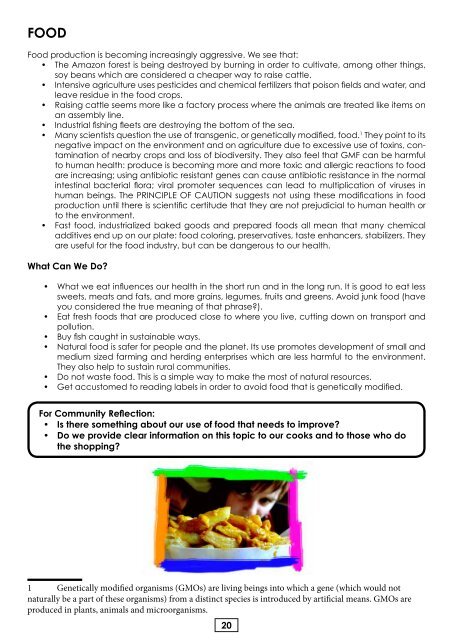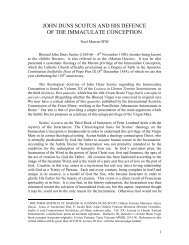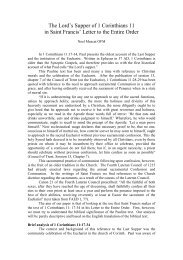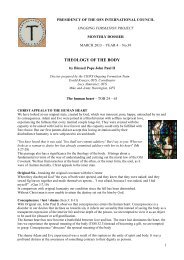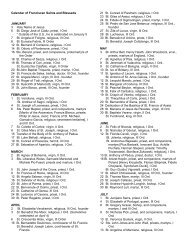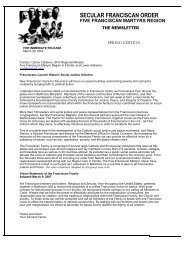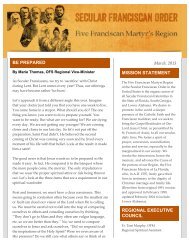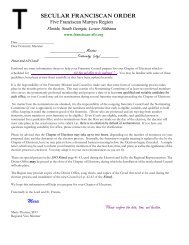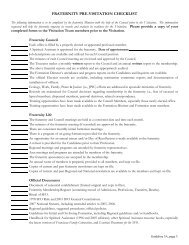Care for Creation in the Daily life of the friars Minor - OFM
Care for Creation in the Daily life of the friars Minor - OFM
Care for Creation in the Daily life of the friars Minor - OFM
Create successful ePaper yourself
Turn your PDF publications into a flip-book with our unique Google optimized e-Paper software.
FOOD<br />
Food production is becom<strong>in</strong>g <strong>in</strong>creas<strong>in</strong>gly aggressive. We see that:<br />
• The Amazon <strong>for</strong>est is be<strong>in</strong>g destroyed by burn<strong>in</strong>g <strong>in</strong> order to cultivate, among o<strong>the</strong>r th<strong>in</strong>gs,<br />
soy beans which are considered a cheaper way to raise cattle.<br />
• Intensive agriculture uses pesticides and chemical fertilizers that poison fields and water, and<br />
leave residue <strong>in</strong> <strong>the</strong> food crops.<br />
• Rais<strong>in</strong>g cattle seems more like a factory process where <strong>the</strong> animals are treated like items on<br />
an assembly l<strong>in</strong>e.<br />
• Industrial fish<strong>in</strong>g fleets are destroy<strong>in</strong>g <strong>the</strong> bottom <strong>of</strong> <strong>the</strong> sea.<br />
• Many scientists question <strong>the</strong> use <strong>of</strong> transgenic, or genetically modified, food. 1 They po<strong>in</strong>t to its<br />
negative impact on <strong>the</strong> environment and on agriculture due to excessive use <strong>of</strong> tox<strong>in</strong>s, contam<strong>in</strong>ation<br />
<strong>of</strong> nearby crops and loss <strong>of</strong> biodiversity. They also feel that GMF can be harmful<br />
to human health: produce is becom<strong>in</strong>g more and more toxic and allergic reactions to food<br />
are <strong>in</strong>creas<strong>in</strong>g; us<strong>in</strong>g antibiotic resistant genes can cause antibiotic resistance <strong>in</strong> <strong>the</strong> normal<br />
<strong>in</strong>test<strong>in</strong>al bacterial flora; viral promoter sequences can lead to multiplication <strong>of</strong> viruses <strong>in</strong><br />
human be<strong>in</strong>gs. The PRINCIPLE OF CAUTION suggests not us<strong>in</strong>g <strong>the</strong>se modifications <strong>in</strong> food<br />
production until <strong>the</strong>re is scientific certitude that <strong>the</strong>y are not prejudicial to human health or<br />
to <strong>the</strong> environment.<br />
• Fast food, <strong>in</strong>dustrialized baked goods and prepared foods all mean that many chemical<br />
additives end up on our plate: food color<strong>in</strong>g, preservatives, taste enhancers, stabilizers. They<br />
are useful <strong>for</strong> <strong>the</strong> food <strong>in</strong>dustry, but can be dangerous to our health.<br />
What Can We Do?<br />
• What we eat <strong>in</strong>fluences our health <strong>in</strong> <strong>the</strong> short run and <strong>in</strong> <strong>the</strong> long run. It is good to eat less<br />
sweets, meats and fats, and more gra<strong>in</strong>s, legumes, fruits and greens. Avoid junk food (have<br />
you considered <strong>the</strong> true mean<strong>in</strong>g <strong>of</strong> that phrase?).<br />
• Eat fresh foods that are produced close to where you live, cutt<strong>in</strong>g down on transport and<br />
pollution.<br />
• Buy fish caught <strong>in</strong> susta<strong>in</strong>able ways.<br />
• Natural food is safer <strong>for</strong> people and <strong>the</strong> planet. Its use promotes development <strong>of</strong> small and<br />
medium sized farm<strong>in</strong>g and herd<strong>in</strong>g enterprises which are less harmful to <strong>the</strong> environment.<br />
They also help to susta<strong>in</strong> rural communities.<br />
• Do not waste food. This is a simple way to make <strong>the</strong> most <strong>of</strong> natural resources.<br />
• Get accustomed to read<strong>in</strong>g labels <strong>in</strong> order to avoid food that is genetically modified.<br />
For Community Reflection:<br />
• Is <strong>the</strong>re someth<strong>in</strong>g about our use <strong>of</strong> food that needs to improve?<br />
• Do we provide clear <strong>in</strong><strong>for</strong>mation on this topic to our cooks and to those who do<br />
<strong>the</strong> shopp<strong>in</strong>g?<br />
1 Genetically modified organisms (GMOs) are liv<strong>in</strong>g be<strong>in</strong>gs <strong>in</strong>to which a gene (which would not<br />
naturally be a part <strong>of</strong> <strong>the</strong>se organisms) from a dist<strong>in</strong>ct species is <strong>in</strong>troduced by artificial means. GMOs are<br />
produced <strong>in</strong> plants, animals and microorganisms.<br />
20


